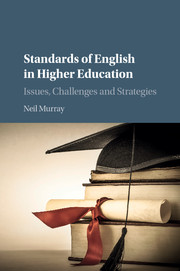Book contents
- Frontmatter
- Dedication
- Contents
- List of figures and tables
- Acknowledgements
- List of acronyms and abbreviations
- Introduction
- 1 The ‘English language question’ in the context of the changing face of higher education
- 2 English language: the need for and impact of policy and regulation
- 3 Seeking definitional clarity: what is ‘English language proficiency’?
- 4 Pre-enrolment language assessment and English language conditions of entry
- 5 Post-enrolment language assessment: challenges and opportunities
- 6 From assessment to provision
- 7 Innovation in English language provision: driving and navigating institutional change
- 8 Innovation in English language provision in higher education: an Australian case study
- References
- Appendices
- Index
1 - The ‘English language question’ in the context of the changing face of higher education
Published online by Cambridge University Press: 05 November 2015
- Frontmatter
- Dedication
- Contents
- List of figures and tables
- Acknowledgements
- List of acronyms and abbreviations
- Introduction
- 1 The ‘English language question’ in the context of the changing face of higher education
- 2 English language: the need for and impact of policy and regulation
- 3 Seeking definitional clarity: what is ‘English language proficiency’?
- 4 Pre-enrolment language assessment and English language conditions of entry
- 5 Post-enrolment language assessment: challenges and opportunities
- 6 From assessment to provision
- 7 Innovation in English language provision: driving and navigating institutional change
- 8 Innovation in English language provision in higher education: an Australian case study
- References
- Appendices
- Index
Summary
Introduction
Few would dispute that the nature of higher education has changed significantly over the course of the past five decades. The pace of that change has accelerated notably in the last fifteen to twenty years such that those working in the sector – and in academic faculties in particular – often feel that no sooner has the implementation of one policy begun to bed down and a sense of routine, rhythm and stability in their working practices returned, than yet another initiative is forthcoming, flowing from which are directives requiring further change, and sometimes even a complete reversal of previous policy and practice. Whether driven by government agendas or ideological shifts within education generally or the institution itself (or indeed both), and whether or not it is desirable and educationally or morally justified, this continual state of flux can be a source of frustration for those at the coalface who are often left feeling as though they never fully manage to implement one directive before they have to respond to a new one. Moreover, it can undermine innovation by engendering feelings of disorientation, cynicism and a general scepticism about the intellectual rigour and integrity underlying policy change. Further, it can lead to a reluctance by academic staff, and indeed administrators, to engage with new initiatives in the near-knowledge that, regardless of how potentially worthwhile they may be, and no matter how praiseworthy the motives driving them, they are unlikely to reach a state of maturity that will ensure the kind and degree of change envisioned by their architects.
Be this as it may, change is, and looks likely to remain, very much part and parcel of higher education as universities position themselves and attempt to respond adroitly to a fast-changing political, educational and social landscape at a time of great economic uncertainty. More than ever, they need to adopt a highly pragmatic stance on policy and practice if, in the face of such change, they are to deliver education of the highest quality while remaining competitive and financially buoyant. As I hope to demonstrate in the pages that follow, while they are certainly not mutually exclusive, efforts to achieve an acceptable balance between the maintenance of educational standards and continued viability as institutions of higher education can, nonetheless, present universities with major ethical quandaries in the face of which the decisions they ultimately make can have far-reaching implications.
Information
- Type
- Chapter
- Information
- Standards of English in Higher EducationIssues, Challenges and Strategies, pp. 7 - 36Publisher: Cambridge University PressPrint publication year: 2015
